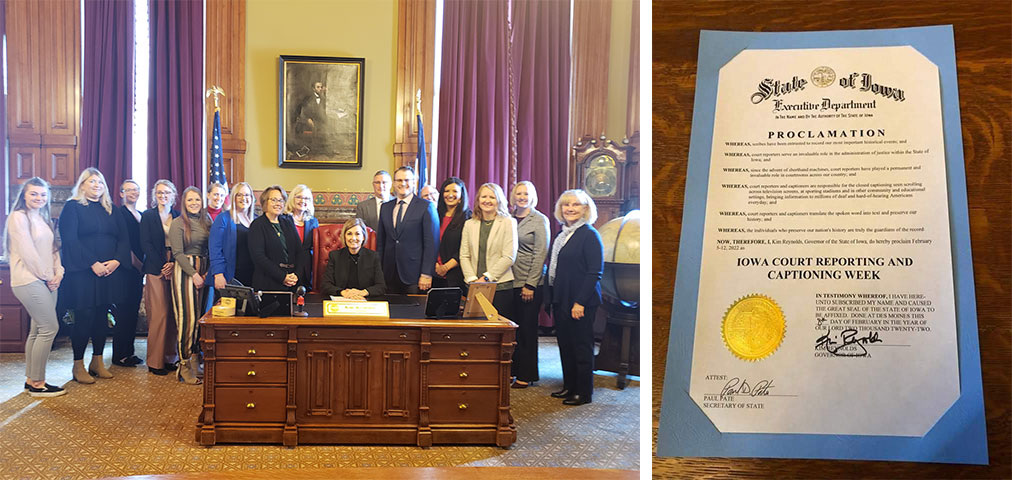Realtime Court Reporting Program Details
Questions? Contact Us!
Deborah DuBuc
Program Chair
dldubuc@dmacc.edu
515-473-5617
Need Help Getting Started?
DMACC
Admissions Office
admissions@dmacc.edu
515-965-7337
Put yourself in the center of fascinating events, discussions, and judicial proceedings
with a DMACC Court Reporting Degree. Be the person entrusted with making an accurate,
verbatim record of everything spoken in the courtroom or pretrial proceedings such
as depositions and statements. In America's judicial system, court reporters are indispensable.
They are the eyes and ears of the courtroom, the impartial "guardians of the record."
Most judicial proceedings cannot start without a court reporter present - because in the judicial world, if it's not "in the record,” it did not happen.
The work of realtime court reporters is not limited to the judicial system. These trained professionals may use their skills, with additional training, to pursue a growing number of options.
- Internet Captioning
- Realtime Broadcast Captioning
- Educational and Business CART (Communications Access Realtime Translation)
- Conferences & Conventions
- Business and Government Meetings
- Legal and Medical Transcription
About Court Reporting
Salary Outlook: The average national annual median salary is $67,310 with the top 10% earning over $127,000, according to the U.S. Bureau of Labor Statistics.
Job Outlook: According to the U.S. Bureau of Labor Statistics, "Despite limited employment growth, about 1,700 openings for court reporters and simultaneous captioners are projected each year, on average, over the decade. Iowa Workforce Development projects 25 Iowa Court Reporter positions annually through 2032.
Accommodating Positions: DMACC is the only institution in Iowa to offer a Realtime Court Reporting degree. Flexible schedules and job openings across the state and country.
How to get started?
Apply to DMACC today. No application fees and you can apply online.
Need money? Visit DMACC's Financial Aid website to learn more about how to fund your education.
High Demand, Great Pay, Potential for Fabulous Benefits and Growth
DMACC's Realtime Court Reporting program prepares students for a variety of careers that require realtime writing skills to convert the spoken word to text via machine shorthand with computer-aided transcription.
The many situations that require verbatim record - notably judicial proceedings, pretrial depositions, and government meetings - have put skilled, dependable court reporters in high demand across the country. With many court reporters retiring in the next few years, the anticipated shortage of these professionals will create even more opportunities for new DMACC graduates.
DMACC Realtime Court Reporting: Live-Virtual Instruction with Caring, Credentialed Faculty
DMACC's unique live-virtual day school program is the only one of its kind in Iowa, developed during a year of collaboration with the Iowa Court Reporters Association and Iowa Bar Association, and is approved by the National Court Reporters Association Council on Approved Student Education.
Realtime Court Reporting students will learn on the most current student-model machine writer, laptops preloaded with the student version of a Computer-Aided Translation software used by current professionals, and will be taught by credentialed instructors with real-world experience.
Some skills and abilities that may make you a good fit for Realtime Court Reporting include:
- Strong vocabulary, grammar, and editing skills
- Attention to detail
- Ability to focus for extended periods
- Good manual dexterity
- Determination and commitment to practice in learning a new skill
Work for Yourself or Others
Skilled court reporters have many job options.
They can work directly for judges, judicial systems, law firms or freelance court reporting entities that often require written records of meetings.
Some become independent contractors or even manage their own businesses, employing others who share their skills.
- This is a full-time, day-time program.
- LIVE-virtual instruction is delivered through Microsoft Teams or Kaltura Classroom. These classes are synchronous, and attendance is required. Most classes meet between 8 a.m. and 2 p.m. Monday through Thursday. Additional online coursework is required and delivered through the Canvas LMS.
- Students are required to come to the DMACC Newton Campus for the first two days of fall semester and are provided additional optional opportunities to meet in person on campus and at local, state, and national conventions throughout the year through participation in the Student Court Reporters Association (SCRA) and departmental events.
- Faculty are caring and highly qualified, certified court reporters with many combined years of experience in court reporting and education.
- Classes are designed for completion in two years if the student completes all speed-development classes on time. (Note: Students develop speed at different rates depending on many factors, including the student’s practice habits.)
- Mentor interactions, shadowing opportunities, and at least 40-hours of verified internship writing time are offered with the cooperation of Iowa Certified Shorthand Reporters and the support of the Iowa Court Reporters Association.
- DMACC’s virtual steno court reporting program is approved by the National Court Reporters Association (NCRA). DMACC is a nationally accredited college (Higher Learning Commission).







